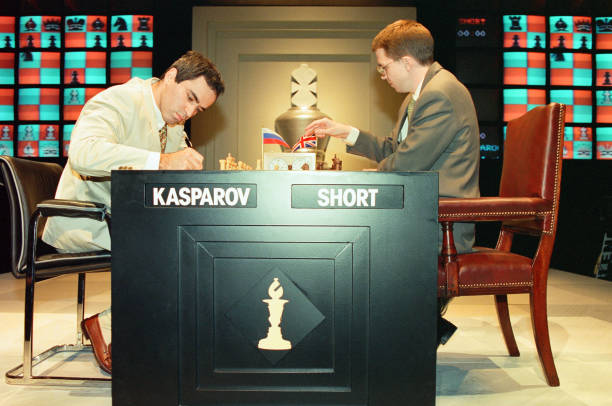In 1993, a dramatic series of events happened that would change the course of the modern chess history once and for all.
After beating Boris Gelfand, Jan Timman and Anatoly Karpov in Candidates match, young English prodigy Nigel Short gained the right to challenge Garry Kasparov in a World Championship match.
Both players were dissatisfied with the bidding process regarding the playing venue of the match, due to the following:
- FIDE President Florencio Campomanes single-handedly picked Manchester as the venue without consulting the players
- London’s offer with the prize fund of 1.7 million pounds, 0.5 million pounds higher than Manchester’s, was ignored
- 20 % of the prize fund would go to FIDE
Therefore, at the annual Linares 1993 tournament, Short and Kasparov announced a historic decision. They decided to play the match outside the auspice of FIDE. A new organization, the Professional Chess Association (PCA) was formed for the marketing and organization of the match.
According to Kasparov, breaking away from FIDE was Short’s suggestion:
„As usual, Linares 1993 assembled almost the entire chess elite, including two new stars – Kramnik and Shirov. Only Short was not playing: three weeks before the start, on 31st January, he defeated Timman in the final Candidates match (6.5-4.5) and won the right to fight with me for the world title. Campomanes promprtly announced that the last date for submitting bids to stage our match was 8th February, but then he granted an extension of two weeks. The first to submit a bid was Manchester (Short’s native city), and Campo hastily declared Manchester to be the match venue, although FIDE had already received a bid from London with a larger prize fund than Manchester’s 1.7 million dollars.
Of course, Short and I were unhappy about such lack of ceremony – the FIDE president has taken a decision about the venue and dates of the match, without even consulting the players. Just before the start of the tournament in Linares, Nigel phoned me and unexpectedly suggested playing the match outside the framework of FIDE, as in former times right up to 1948. Thinking that Short – at that time the last GMA President – would bring western grandmasters with him and that we would create a new, effective and professional organisation, I replied that I had been awaiting such a call for manyy years, and after some hesitation I agreed with my opponent’s proposal. (Looking ahead, I should say that I overestimated Short, and the hoped of uniting the efforts of the GMA and PCA were not realised.)
(Source: Garry Kasparov on Garry Kasparov, Part Two: 1985-1993, page 273)
The match was held from September to October 1993.
Although it generated immense interest and Short appeared in commercials on the BBC, the play was extremely one-sided. Kasparov dominated the match from the start to finish. The games were double-edged, but Short only to managed to score a consolation goal with a win in the 16th game. With the final result of 12.5 – 7.5 Kasparov won the match convincingly and retained the title of the PCA World Chess Champion. Thus, Kasparov justified his pre-match statement – the challenger will be Short and the match will be short.
In response to their breakaway, FIDE responded by stripping Kasparov and Short of their statuses of FIDE Champion and Challenger and erased their FIDE Elo ratings. In order to fill the vacant spots, FIDE organized the match for the crown between the two finalists of the Candidates cycle, Anatoly Karpov and Jan Timman. FIDE officially refused to recognize Kasparov as a champion and insisted that the winner of their match is the only legitimate World Chess Champion.
The public opinion gravitated toward Kasparov nevertheless. PCA Champions would be recognized as the Classical World Champions in the eyes of the broad chess public. But FIDE would also continue to organize its own cycles. Thus, the chess world had two World Champions. Such a state of affairs would continue until the Kramnik – Topalov unification match in 2006.

